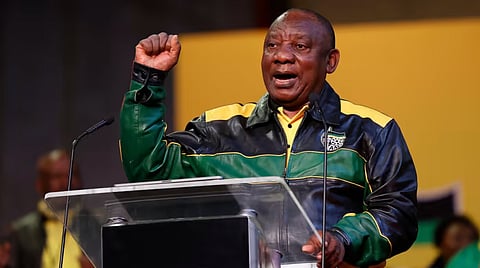FT on Phala Phala: “The whole affair reeks”, as Ramaphosa clings on
The world is watching – in disbelief, mind you – as President Cyril Ramaphosa lurches from crisis to scandal to damage control. The opinion piece by the Financial Times of London is a hard-hitting piece which cuts through a lot of the frills, right to the heart of the matter. The FT's Editorial Board reaches the conclusion that: "The humbling of the president shows that, if South Africa is to pull back from the brink, it must look beyond the ANC." That Ramaphosa has gone to the Constitutional Court to challenge the findings of the independent panel is certainly his prerogative – and it's an act that may even see him win legally. But it's the battle of perception, which is very often considered reality in political terms, where this whole sordid saga has severely dented his image as Mr #Renew22 just days before seeking a second term. – Michael Appel
The humbling of Cyril Ramaphosa
The FT's View: By The Editorial Board
For now, at least, Cyril Ramaphosa lives to fight another day. The president of South Africa was on the verge of resigning last week after a damning report into an affair involving the sale of buffalo and stolen cash that had been stuffed down a couch on his private ranch. His allies in the ruling African National Congress have instead persuaded him to tough it out. He could be re-elected as head of the party for another term next week.
That Ramaphosa should be all that stands between the ANC and the abyss shows just how low the party of Nelson Mandela has sunk. The man whose rise to president in 2018 was meant to haul the ANC back from the era of state capture presided over by Jacob Zuma is deeply compromised himself.
Nor is the president the electoral asset he once was. His personal popularity used to be worth at least a few extra percentage points to an ANC that is thoroughly discredited with the black urban voters who should be its mainstay.
Even now he could be brought down by the sordid, not to say farcical, story of what happened on his farm. The president is challenging in court the findings of a panel, which said he may have broken the law after failing to report the theft of unexplained cash. His allies have attacked the provenance of the exposé, first revealed by Arthur Fraser, who ran the spy agency when Zuma was president.
That Fraser may have an ulterior motive in besmirching the president's name is not in doubt. But the whole affair reeks. Ramaphosa's explanations for how the money came to be on his property after the supposed sale of buffalo to a Sudanese businessman are unconvincing.
A multitude of questions still lack proper answers. Why wasn't the cash — at least $580,000 and possibly several million dollars — declared, as it should have been under foreign exchange laws? Why did Ramaphosa not report the incident to the police? Why, for that matter, are the buffalo still in situ?
If the president has any hope of restoring moral authority — which is essential if he is to tackle the rot festering within the ANC — he cannot simply go on blocking the inquiry and possible impeachment. He needs to clear his name. South Africans deserve a proper explanation for what really happened on his Phala Phala ranch.
Ramaphosa is a gifted and charismatic politician. But his first term has fallen badly short. In what has become a fight for the soul of the ANC, he has lacked moral courage.
Cronyism and corruption have bled into every sphere of national life. Delivery of services, including water, security and housing, is a shambles, partly because local cadres pocket much of the money intended for the public. Eskom, the state electricity utility, cannot keep the lights on, crippling business and stymying the growth that is South Africa's only hope of tackling the searing inequalities that make it a tinderbox.
The Phala Phala affair will probably hasten the decline of the ANC. Given the state the party is in, that may be no bad thing. It is very likely that the ANC vote will drop below 50 per cent in 2024 for the first time in a general election since the end of apartheid in 1994.
That would usher in a spell of coalition politics, which could possibly bring fresh ideas. But it might equally lead to a dangerous lurch to the radical left and set off a Zimbabwe-style spiral.
There is no obvious successor to Ramaphosa, which is a sign in itself that talented young South Africans no longer see the ANC as a genuine agent of change. The humbling of the president shows that, if South Africa is to pull back from the brink, it must look beyond the ANC.
Read also:
Copyright The Financial Times Limited 2022
© 2022 The Financial Times Ltd.

